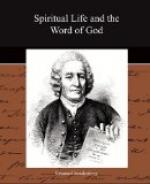The Word in the sense of the letter appears very simple, and yet there is stored up in it the wisdom of the three heavens, for each least particular of it contains interior and more interior senses; an interior sense such as exists in the first heaven, a still more interior sense such as exists in the second heaven, and an inmost sense such as exists in the third heaven. These senses are in the sense of the letter, one within the other, and are evolved therefrom one after the other, each from its own heaven, when the Word is read by a man who is led by the Lord. These interior senses differ in a degree of light and wisdom according to the heavens, and yet they make one by influx, and thus by correspondences. How they thus make one shall be told in what follows. All this makes clear how the Word was inspired by the Divine, and that it was written from an inspiration to which nothing else in the world can in anywise be compared. The mysteries of wisdom of the three heavens contained in it are the mystical things of which many have spoken. (A.E., n. 1079.)
IV. Influx and Correspondence
It has been said that there is a Word in each heaven and that these Words are in our Word in their order, and that they thus make one by influx and consequent correspondences. Here, therefore, it shall be told what correspondence is and what influx is; otherwise what the Word is inwardly in its bosom, thus in respect to its life from the Lord, which is its soul, cannot be understood.
But what correspondence is and what influx is shall be illustrated by examples. The changes of the face that are called expressions correspond to the affections of the mind; consequently the face changes in respect to its expressions just as the affections of the mind change in respect to their states. These changes in the face are correspondences, as consequently the face itself is; and the action of the mind into it, that the correspondences may be exhibited, is called influx. The sight of man’s thought, which is called the understanding, corresponds to the sight of his eyes; and consequently the quality of the thought from the understanding is made evident by the light and flame of the eyes. The sight of the eye is a correspondence, as consequently the eye itself is; the action of the understanding into the eye, by which the correspondence is exhibited, is influx. Active thought, which belongs to the understanding, corresponding to speech, which belongs to the mouth. The speech is a correspondence,




